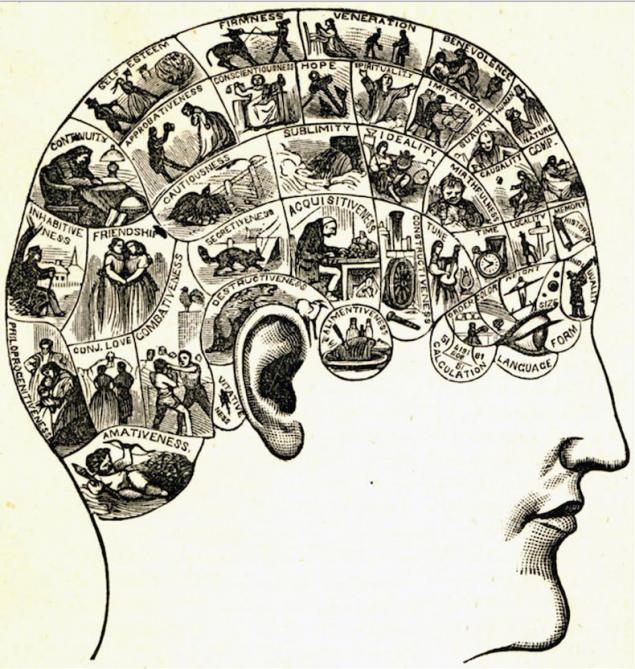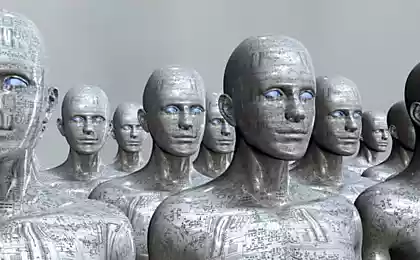513
The problem of consciousness in psychology and philosophy: who controls our thoughts?
Whatever you thought, not the fact that it's your thoughts.
English scientist, philosopher and writer Keith Frankish explains how today addressed the problem of consciousness in psychology and philosophy, why we are confused about their own beliefs and can actually be responsible for their decisions, if our understanding of our own thoughts and actions are the product of self-construal and often erroneous.

Do you think racial stereotypes are false? Are you sure? I'm not asking if the stereotypes are false, I ask that you believe or not in what you believe. This question may seem strange. We all know what we think, isn't it?
Most philosophers dealing with the problem of consciousness, we agree, considering that we have privileged access to our own thoughts, which are largely immune from mistakes. Some argue that we have "inner feeling", which controls consciousness as well as external feelings control the world. However, there are exceptions.
Philosopher-a behaviorist mid-20th century, Gilbert Ryle believed that we learn about our own minds from our inner feelings, and observing their own behavior – and that our friends would know our minds better than we do (hence the joke: two behaviorist have just had sex; then one turns to other and says, "You were very good, my dear. How can I?").
And contemporary philosopher Peter Carruthers offers a similar view (although on other grounds), arguing that our understanding of our own thoughts and decisions are the product of self-construal and often erroneous.
The evidence of this can be found in the experimental studies in social psychology.
It is well known that people sometimes think that they have beliefs, which they actually not.
For example, if you have a choice between multiple identical items, people usually choose the one on the right. But when the man asked why he chose this, he begins to invent reasons, claiming that, as it seemed, it had a nicer color, or it was of the best quality.
Similarly, if a person performs an action in response to the previous (and now forgotten) suggestion, he will write the cause of his execution.
The impression that actors involved in unconscious self-interpretation. They have no real explanation of their actions (choosing the right side of suggestion), so they derive some kind of probable cause, and ascribe it to yourself. They don't know what do interpretacji, however, explain the behavior as if they had been really aware of its causes.
Other studies confirm this explanation. For example, if people are instructed to nod their heads while listening to a recording (as they said to test headphones), they Express more agreement with what they hear than if they were asked to shake their heads from side to side. And if they are required to choose one of two items they had previously rated as equally desirable, then they say they prefer the one they chose. Again, apparently, they subconsciously interpretiruya their own behaviour, taking its nodding for the indicator consent and your choice for the revealed preference.
Based on such evidence, Carruthers does make a compelling argument in favor of the interpretive perspective on identity outlined in his book "Clouding of consciousness" (2011). It all starts with the assertion that humans (and other primates) have special mental subsystem to understand the thoughts of other people, which, based on observations of the behavior of people rapidly and unconsciously generates knowledge about what others are thinking and feeling (the data for a "reader consciousness" of the system have different sources, including the speed with which infants develop the understanding of the people around them).
Carruthers claims that this system is responsible for knowledge of our own mind. People don't develop a second, "reading the mind" system, looking inside (the inner sense); rather, they develop self-knowledge, guiding system, looking out for themselves. And because the system is directed outwards, it only has access to sensory channels and has to draw their own conclusions based solely on them.
The reason we know our own thoughts better than the thoughts of others, lies only in the fact that we have more sensory data that we can use not only the perception of their own speech and behavior, but also our emotional reactions, bodily feelings (pain, position, limbs, etc.), as well as a rich variety of mental images, including a steady stream of inner speech (there is strong evidence that mental images are connected, the same mechanisms of the brain, and perception, are, like him). Carruthers, calls it a Theory of interpretive sensory access (Interpretive Sensory-Access (ISA) theory; ISA), and he confidently leads a vast array of experimental evidence in its support.
Theory ISA has several striking consequences. One of them is that (with some exceptions) we do not have conscious thoughts and we don't take conscious decisions. For if they were, we would know about them directly and not in the result interpretation. Conscious events that we experience are variations of the touch States and what we experience as conscious thoughts and decisions, is actually sensual images — in particular, episodes of inner speech. These images can Express ideas, but they need interpretation.
Another consequence is that we can be truly mistaken about our own beliefs. Back to my question about racial stereotypes. I think you said, in your opinion, they are false. But if the ISA theory is correct, you can't be sure that you think so. Studies show that people who sincerely say that racial stereotypes are false, often continue to behave as if they are true, when do not pay attention to what they are doing. This behavior is usually characterized as a manifestation of a hidden tendency, which is in contradiction with the explicit beliefs of a person.
But the theory ISA offers a more simple explanation. People think stereotypes are true, but also believe that to acknowledge this is unacceptable, so talking about their falsity. Moreover, inner speech, they say it themselves and mistakenly interpretiruya that as their belief. They are hypocrites, but not conscious hypocrites. Maybe we all are.
If all of our thoughts and decisions are unconscious, as suggested by the ISA theory, moral philosophers have to do a lot of work. Because we tend to think that people can't take responsibility for their unconscious position. The adoption of the ISA theory does not mean abdication of responsibility, but it will mean a radical rethinking of the concept.published
On materials: "Whatever you think, you don't necessarily know your own mind"/Aeon
P. S. And remember, just changing your mind — together we change the world! ©
Source: monocler.ru/problema-samointerpretatsii/
English scientist, philosopher and writer Keith Frankish explains how today addressed the problem of consciousness in psychology and philosophy, why we are confused about their own beliefs and can actually be responsible for their decisions, if our understanding of our own thoughts and actions are the product of self-construal and often erroneous.

Do you think racial stereotypes are false? Are you sure? I'm not asking if the stereotypes are false, I ask that you believe or not in what you believe. This question may seem strange. We all know what we think, isn't it?
Most philosophers dealing with the problem of consciousness, we agree, considering that we have privileged access to our own thoughts, which are largely immune from mistakes. Some argue that we have "inner feeling", which controls consciousness as well as external feelings control the world. However, there are exceptions.
Philosopher-a behaviorist mid-20th century, Gilbert Ryle believed that we learn about our own minds from our inner feelings, and observing their own behavior – and that our friends would know our minds better than we do (hence the joke: two behaviorist have just had sex; then one turns to other and says, "You were very good, my dear. How can I?").
And contemporary philosopher Peter Carruthers offers a similar view (although on other grounds), arguing that our understanding of our own thoughts and decisions are the product of self-construal and often erroneous.
The evidence of this can be found in the experimental studies in social psychology.
It is well known that people sometimes think that they have beliefs, which they actually not.
For example, if you have a choice between multiple identical items, people usually choose the one on the right. But when the man asked why he chose this, he begins to invent reasons, claiming that, as it seemed, it had a nicer color, or it was of the best quality.
Similarly, if a person performs an action in response to the previous (and now forgotten) suggestion, he will write the cause of his execution.
The impression that actors involved in unconscious self-interpretation. They have no real explanation of their actions (choosing the right side of suggestion), so they derive some kind of probable cause, and ascribe it to yourself. They don't know what do interpretacji, however, explain the behavior as if they had been really aware of its causes.
Other studies confirm this explanation. For example, if people are instructed to nod their heads while listening to a recording (as they said to test headphones), they Express more agreement with what they hear than if they were asked to shake their heads from side to side. And if they are required to choose one of two items they had previously rated as equally desirable, then they say they prefer the one they chose. Again, apparently, they subconsciously interpretiruya their own behaviour, taking its nodding for the indicator consent and your choice for the revealed preference.
Based on such evidence, Carruthers does make a compelling argument in favor of the interpretive perspective on identity outlined in his book "Clouding of consciousness" (2011). It all starts with the assertion that humans (and other primates) have special mental subsystem to understand the thoughts of other people, which, based on observations of the behavior of people rapidly and unconsciously generates knowledge about what others are thinking and feeling (the data for a "reader consciousness" of the system have different sources, including the speed with which infants develop the understanding of the people around them).
Carruthers claims that this system is responsible for knowledge of our own mind. People don't develop a second, "reading the mind" system, looking inside (the inner sense); rather, they develop self-knowledge, guiding system, looking out for themselves. And because the system is directed outwards, it only has access to sensory channels and has to draw their own conclusions based solely on them.
The reason we know our own thoughts better than the thoughts of others, lies only in the fact that we have more sensory data that we can use not only the perception of their own speech and behavior, but also our emotional reactions, bodily feelings (pain, position, limbs, etc.), as well as a rich variety of mental images, including a steady stream of inner speech (there is strong evidence that mental images are connected, the same mechanisms of the brain, and perception, are, like him). Carruthers, calls it a Theory of interpretive sensory access (Interpretive Sensory-Access (ISA) theory; ISA), and he confidently leads a vast array of experimental evidence in its support.
Theory ISA has several striking consequences. One of them is that (with some exceptions) we do not have conscious thoughts and we don't take conscious decisions. For if they were, we would know about them directly and not in the result interpretation. Conscious events that we experience are variations of the touch States and what we experience as conscious thoughts and decisions, is actually sensual images — in particular, episodes of inner speech. These images can Express ideas, but they need interpretation.
Another consequence is that we can be truly mistaken about our own beliefs. Back to my question about racial stereotypes. I think you said, in your opinion, they are false. But if the ISA theory is correct, you can't be sure that you think so. Studies show that people who sincerely say that racial stereotypes are false, often continue to behave as if they are true, when do not pay attention to what they are doing. This behavior is usually characterized as a manifestation of a hidden tendency, which is in contradiction with the explicit beliefs of a person.
But the theory ISA offers a more simple explanation. People think stereotypes are true, but also believe that to acknowledge this is unacceptable, so talking about their falsity. Moreover, inner speech, they say it themselves and mistakenly interpretiruya that as their belief. They are hypocrites, but not conscious hypocrites. Maybe we all are.
If all of our thoughts and decisions are unconscious, as suggested by the ISA theory, moral philosophers have to do a lot of work. Because we tend to think that people can't take responsibility for their unconscious position. The adoption of the ISA theory does not mean abdication of responsibility, but it will mean a radical rethinking of the concept.published
On materials: "Whatever you think, you don't necessarily know your own mind"/Aeon
P. S. And remember, just changing your mind — together we change the world! ©
Source: monocler.ru/problema-samointerpretatsii/
Unlived emotions — unstoppable destiny
Woman will never be able to give my son something that will make him a real man























